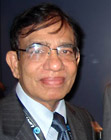
Prescription drug abuse – A major societal problem? Part II

The recent ‘death of a diva,’ the iconic singer Whitney Houston, has reopened the debate on prescription drug abuse and its disastrous consequences. As you all know, the media coverage has been quite intense in the last few days. Whitney Houston, Michael Jackson, Anna Nicole Smith and many others in the past have succumbed to this dreadful habit. How do you stop this ever escalating problem and how can we protect our loved ones from these tragedies?
While in practice, I used to get requests from patients for a prescription of narcotic pain medications. And often they would slip this in casually at the end of their visit like, "Oh, I am running out of my pain meds, can you please refill it?" Or, "I lost the previous prescription, I need another one," etc. Some of them get the same drug from multiple sources and at times don't hesitate to use fake prescriptions. Unfortunately, doctors are often targets for drug pushers and addicts. But I must admit there are also pill mills where drugs can be obtained without difficulty for a hefty fee.
Let's try to understand the basis of the problem. Most habit-forming drugs, especially narcotics such as oxycodone — perhaps the most commonly abused drug — are quite powerful in their potential for addiction. Often, the users don't know this. Withdrawal needs close monitoring, special attention and in some cases, hospitalization. The users crave the drug and will line up at pain clinics for long periods of time to get their refill. That is the nature of the illness.
The most difficult aspect of therapy is the inherent ability of the pain itself to erase the idea that a pain-free life is possible without the drugs. One detox expert told me that the craving for the drug is always on the addict's mind. This mindset needs to change. Another issue is that the drug habit becomes a social glue among users. They often hang out together, bound by their common interest. This type of networking poses a formidable challenge to rehabilitation and recovery. Also, the habit can return like an old plague if the patient is not totally committed to withdrawal.
Social and societal consequences of drug addiction are many: domestic violence, motor vehicle incidents, theft, severe violence and even more. Those who are high on these drugs don't know what they are doing. Society needed to be protected from them. And the users need to be protected from themselves.
It's important for all of us to take personal responsibility for our own actions. Since addiction is almost self-perpetuating, the earlier you start the withdrawal process, the better. The emphasis should be on preservation of one's health and long-term well-being without harping solely on medication to kill every pain.
When my article on ‘drug abuse’ appeared in Tampa Bay Times a few weeks ago, two blogs appeared at the Times Web site that are noteworthy:
- “The very serious issue is that kids are now taking these pills like candy. 2,500 kids try prescription drugs for the first time every day, and there's no sign that this number will stop growing. My teen-savers counselors treat teen addicts and they tell us that the anti-drug message is missed at home. Our counselors also recommend home drug testing. Parents can detect teen drug use with accurate and reliable home kits.”
- “Prescription drugs have robbed far too many people of their dignity and lives. On line pharmacies and easy availability of drugs on the streets are doing a lot of damage. One estimate puts the death rate from these drugs at about 100,000 deaths per year! Prescription drugs are more dangerous than any felony drug substance in the world including heroin, cocaine and even alcohol combined. “
Unfortunately, we do not have many good drug treatment centers (detoxification and rehab) easily available to those seeking help. In many counties, mental health support is almost non-existent. Many such centers have already closed and hence these patients have to go to Emergency Rooms from where they are discharged back on to the streets or to the same environment with no specific plans or interventions. The situation needs to improve before we can eliminate the problem of addiction.
Many types of chronic pain, especially back pain, can be tackled by a combination of regular exercise, proper diet, maintenance of normal body weight, avoiding bad habits such as smoking and excessive alcohol use and, of course, no substance abuse. Proper relaxation techniques are crucial too. I recommend yoga with its bountiful benefits to your body and mind. Many professional athletes now practice yoga regularly. It is drug-free. A good pain management specialist can recommend other options that do not involve chronic, addictive drugs. But, yes, you will need willpower and total commitment to embark on the journey toward total withdrawal.
End of the series
Dr. M. P. Ravindra Nathan is a Brooksville cardiologist.